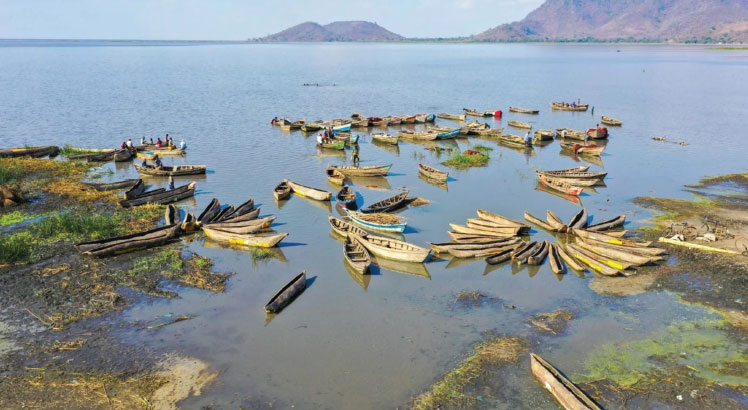Low rains stress Lake Chilwa
The Intergovernmental Panel on Climate Change (IPCC) warned this month that greenhouse gas in the atmosphere is high enough to guarantee climate disruption for decades if not centuries.
This is already taking its toll on Lake Chilwa.
Almost 1.5 million Malawians depend on the country’s second largest lake to make a living.
Professor Sosten Chiotha, regional director of Leadership for Environment and Development (Lead), says climate change has resulted in less rainfall and abnormally low water levels in the lake.
He explains: “Water variations are normal, however the connection with climate change is that the factors that drive the drying are actually periods of low rainfall. In the Lake Chilwa Climate Change Adaptation project, we actually elaborated that if you have three consecutive rainy seasons, with rainfall below 1 000mm, then the lake is likely to dry. “

Records show the lake has dried completely almost 10 times in the last century. According to literature, it was a cycle of 20 to 25 years. From the 1990s, the frequency of the drying has increased with extreme weather events typical of climate change.
Chiotha states: “Climate change has introduced extremity in weather. So, we are having more dry spells and that is why the lake seems to be drying more frequently than it used to in the past. So, the current drying is not normal. The current fluctuations in water levels are not normal and that is because of the extremes in the rainfall.”
Lack of research
Away from the Lake Chilwa basin, the IPCC report is the most detailed assessment of climate science ever undertaken, explaining how—and how fast—greenhouse gas emissions are changing the planet.
But experts caution that the comprehensive global review contains blind spots, overlooking regions that are highly vulnerable to the impacts of climate change but where data on those impacts is severely lacking.
The IPCC provides a two-page factsheet on observed and projected climate trends in Africa, but the scantiness of data is inescapable in the maps.
Of the nine African sub-regions, the IPCC noted an observed increase in extreme rainfall for just two—western and eastern southern Africa. For the other seven it said “limited data and literature” were available.
Only half of the sub-regions provided sufficient data to determine an increase in rates of drought.
Mohamed Adow, director of climate and energy think-tank Power Shift Africa in Kenya, likened the lack of data to the old philosophical saying: If a tree falls in a forest and no one is around to hear it, does it make a sound?
“People in Africa are certainly aware of the overwhelming heat, rising seas and extreme weather on the continent, but if they are not being recorded by scientists it will be much harder for African voices to be heard in the climate debate to tackle it,” he told AFP.
The IPCC reports that “human activities” were responsible for the 1.1C of warming above pre-industrial levels observed so far.
But Adow underscores a basic injustice: most climate-vulnerable nations are virtually blameless for the emissions that are driving ever more extreme weather.
He says: “Africa is most affected and yet least responsible for climate change.
“Sadly, it’s also producing the least scientific research, and this lack of research is hurting the region’s ability to adapt.
We need to urgently address this and ensure researchers and funders come together and invest in filling these glaring gaps in climate research.”
Male-dominated
Of the 116 authors who contributed to the report, just 13 come from non-G20 nations, for example. And the overall writing team is 72 percent male.
Maisa Rojas Corradi, coordinating lead author of the opening chapter and director of the Centre for Climate and Resilience Research in Chile, said efforts had been made to make this team more diverse.
“I know that this was a worry that was actively worked on when the author team was selected, they really tried to have more women and more regional representation,” she told AFP.
Corradi said there were still too many obstacles stopping research conducted in regions where climate change is already hitting hard. These include studies not written in English or not published in mainstream scientific journals, she said.
“If you live in a country where the scientific community is small or some aspects aren’t being investigated comprehensively, then the IPCC can’t really say anything.”—AFP/Africa News





